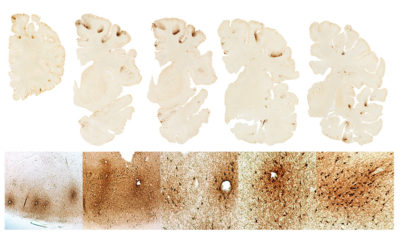
Aaron Hernandez, a former New England Patriots tight-end and convicted murderer, had CTE, the Boston University Chronic Traumatic Encephalopathy (CTE) Center found.
Hernandez’s brain was donated to the CTE Center after he hanged himself in April in a maximum security prison days after his acquittal.
CTE Center Director Ann McKee conducted Hernandez’s brain exam and concluded that he had Stage 3 CTE – Stage 4 being the most serious form of the disorder.
The CTE Center declined to comment further.
CTE is a neurodegenerative disorder caused by repeated sub-concussive blows to the head, said David Somers, a BU professor of psychological and brain sciences.
The exact cause of CTE after head trauma is still unclear to researchers, Somers said, but the effects on the brain are evident.
“With neurodegenerative diseases,” Somers said, “brain volume is diminishing and you can see that by what’s missing. There’s cerebrospinal fluid that takes over that volume in the brain where there used to be tissue.”
CTE causes damage to the frontal cortex, a part of the brain that controls cognition and emotions, Somers said.
Symptoms associated with people who have CTE include emotional regulation difficulties, depression, rage control issues, cognitive deficits and problems with working memory.
In the years before his suicide, Hernandez exhibited behavior that was reflective of some of these characteristics. He was involved in a bar fight, several shootings and a murder, but it is unclear whether these actions were triggered by the CTE or other factors.
The CTE found in Hernandez’s brain was advanced for someone his age, Somers added. For a young adult like Hernandez, the brain should have been healthy and plump, filling in the skull cavity well.
“It’s pretty remarkable to see such […] neurodegeneration in somebody at age 27,” Somers said. “It’s definitely something that football players should be concerned about.”
Images of the biopsies of Hernandez’s brain released by the CTE Center show the characteristic signs of a brain with CTE, including the accumulation of tau protein in the frontal lobes of the brain and around small blood vessels.
Several students said they were not surprised by the CTE Center’s findings and that they see the dangers of playing football as self-evident.
Jasmyn Barringer, a student in the Graduate School of Arts and Sciences, said she thinks the CTE Center’s report is unsurprising. She said the NFL should do more to protect its players.
“I think the NFL is very well aware of the physical effects that playing football has on their players,” she said. “They kind of disregard that because of the money that they make.”
Jared Brill, a senior in the College of Communication, said the CTE Center’s conclusion did not change his perception of football. However, he said the findings should not stop people from playing football if they want to.
“I feel like it’s fairly well known that repeated head trauma can lead to mental instability,” Brill said. “I don’t think that’s any reason to ban people from deciding what they want to do.”
Fedor Kurkin, a senior in the Sargent College of Health and Rehabilitation Sciences, said the CTE Center’s results do a good job explaining the results of their studies, but they do not change much.
“[The research] just sort of quantifies it a little bit,” Kurkin said. “But it doesn’t really change the big picture.”























































































































